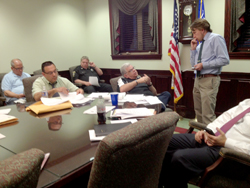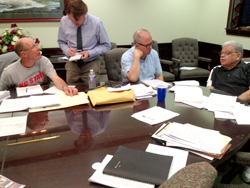A Typical Meeting at the Town of Niagara
By Frank Parlato
The Niagara Falls Reporter attended a Town of Niagara work session meeting last Thursday expecting that the longstanding fight between councilmember Robert Clark and Town Supervisor Steve Richards would, as it often does, erupt into some kind of explosion, and lead to a story our readers might find interesting.
Supervisor Richards along with Clark and Council members Danny Sklarski and Charles Teixeira were in the conference room when I arrived along with Town Attorney Mike Risman. Absent was councilmember Marc Carpenter.
There were people with business before the board, along with two of my colleagues, the urbane and sophisticated Thad Komorowski of the Buffalo News and that enterprising young firebrand Justin Sondel from the Niagara Gazette.
On the agenda were two-dozen items, which meant it would be a long night.
About four minutes into the meeting, something cropped up.
The board was getting a report from the town's recreation director, Susan Kotlarz, about some 28 people approved for summer jobs at the town park.
Apparently there was a list, or rather two lists of people who were to be hired this year.
"The first (list) I submitted," Kotlarz said, "should be attached to the agenda."
Clark said, "Then we had (another list) received on the 16th of May… I just got it in my mailbox."
"There is a name (on the new list) that’s been eliminated,"said Kotlarz.
"And one name added, on the advice of the attorneys" Richards added.
Curiously, I watched a man who was at the meeting leave abruptly, seemingly disturbed. I later learned he was the man who was eliminated from the list.
I sat through two hours of agenda items, from design changes on a property, dugouts for little leagues, proposed drug testing for town employees, a company wishing to do photography for the town and a report concerning the town's proposed acquisition of the Army base on Porter Road.
John Hutchins, owner of Rapids Theater in Niagara Falls, proposed Saturday night concerts in the park.
For his free concerts, the town would get nothing, but neither would it cost the town anything. Hutchins would make his money selling beer.
For his ticketed concerts, Hutchins offered the town 10 percent of ticket sales.
Councilman Sklarski asked if the town would get a share of food and beverage sales.
Hutchins: “We would need to keep the pouring rights for beer and pop.”
Sklarski (asking the same question, but slightly differently): “Is that 10 percent of the total gross?”
Hutchins: “Ten percent of ticket sales only.”
Sklarski: “What about beer?”
Hutchins: “The state Liquor Authority doesn't allow us to share.”
In this, Hutchins was technically correct but he dodged Sklarski's shaft: If Hutchins could not share beer sales on a percentage basis, he could offer a flat rent for all concessions, or pay a set fee for use of the parkland.
Hutchins said (cleverly, for all of the profits are in the alcohol): “You are required to have food (with beer sales), according to the Liquor Authority… If you guys want to do the (usually unprofitable)food sales, that’s up to you."
Sklarski (pressing to the heart of the matter): “What type of bands?”
Hutchins: “Alternative rock to a heavy metal... We do a lot of Indy rock bands….”
Teixeira: “You gonna bring chairs in?”
Hutchins: “The people will bring their own (or sit or dance on the park's grass).”
Texeira: “Will there be mosh pits?” (moshing, a kind of dance, where participants slam into each other, is associated with "aggressive" music. Moshing happens in a "pit". Injuries have been reported and a few deaths have occurred).
Hutchins: “It depends on the band.”
Texeira: “It's crazy. They go into mosh pits and come out all bloody and beat up?”
Hutchins: “Those things happen spontaneously …But security is trained for that. When that happens the security moves right in and they are controlling (the violence). When we are having that kind of band we have a lot more security."
Apropos of this, one remembers the July 4th weekend of 2011 when, at one of Hutchins’ concerts, one man was shot, others were stabbed and more than a 1,000 people spilled into the street as a riot broke out at the Rapids Theater. His security totally unable to handle the riot, he needed the help of not only the Niagara Falls police but also the Town of Niagara police department.
"Could we get an approval at the next meeting?" Hutchins asked.
"No," Richards said.
As the meeting went into its second hour, the storm between Clark and Richards broke loose. It was over the hiring of an outside fire inspector.
The background is this: Richards, along with Teixeira and Sklarski, in voting to reduce property taxes for residents by 9.3 percent and businesses by 6.8 percent, cut 1½ positions from the town's inspection department, saving $110,562. One of the inspectors, Jeff Stahlman, is a friend of Clark's.
Another inspector, Charles Haseley, an ally of Clark's, had his job reduced to 18 hours.
Richards’ argument was that Lewiston, with a population of 16,262, has only one building inspector. Wheatfield, 18,450 people, has only one building inspector. The Town of Niagara, with a population of 8,378, less than half of the two neighboring towns, had two building inspectors.
The plan was to hire an outside fire inspector who would not cost the town any money. It seemed a no-brainer, but that didn't stop Clark from challenging Richards.
When Sklarski pointed out how far behind the two inspectors were last year, Clark said, "Mr. Haseley told me they are not technically behind."Richards: “He's not being truthful with you.”
Sklarski: “Do the math, on average (they should do) 250 (inspections to keep pace with required inspections). They only did 32.”
Clark: (referring to Haseley) “We have a fire inspector on payroll.”
Sklarski: “We are not here to debate that. We're here to put a position in place.”
Clark: “We already have somebody in that position now. It is possibly part of their duties. (Haseley) does not know what his full duties entail.”
Richards: “He knows exactly what his full time duties are.”
Clark (sarcastically, referring to Haseley's cut in hours): “His part-time duties?”
A discussion went on about the fact that it would not cost the town a dime to hire an outside fire inspector. In fact, it would earn the town money since the inspector would get no pay but split fees the town normally charged for inspections.
Clark either didn't like or understand the idea.
Clark: “There is nothing budgeted [for this job].”
Richards: “First of all, it isn't budgeted. It is an income source….If he does 30 inspections (the town makes money) What is wrong with that? (Taxpayers) paid $179,000 per year for three people that did 20 inspections in one year.
Clark: “They did more than 20 inspections in one year.”
Richards: “Stop it. Stop it.”
Clark: “Come on.”
Richards: “Stop it… This is a self-funded position that the board approved a long time ago and they never implemented it.”
Clark … “We never approved … we discussed it, sure”
Richards: “Stop it.”
Clark: “No.”
Richards: “…Places are burning down. You're putting this town in jeopardy over the job that will get done more efficiently and the town will make money.”
Clark: “Wasn't the town making money prior to that also [with fines and inspection fees]”
Richards (sarcastically) “Well, I don't know. With $179,000 (in salary and benefits)you tell me if the town was making money…
Clark: “They are not making any money (now) because there is nobody in there for extra permits.”
Richards: “You tell me: $179,000 it [used to cost] this town to run a department with three full-time people … You look around this town… you proud of the job they are doing? Drive down Hyde Park Blvd. Go through your own neighborhood…”
Cark: “There is nobody (left) to do it… How (is Haseley) supposed to do it in18 hours?”
Richards: “18 hours?”
Clark: “Let me finish”
Richards: … “I am tired of arguing with you when you don't know the facts and you refuse to … Now you're making a political football out of fire inspections.”
Clark: How am I making this political? If we are losing money from that department [it is because] there's nobody in there to work…. We cannot take in permits. … When they(inspections department) can't take in permits or they can’t set fines or they can't do what they're supposed to do, that affects the courts which in turn affects other departments.
Richards: “Affects the courts?”
Clark: Yes… They set a fine, they go to court, nobody is there (inspectors at court.)”
Richards: “Stop it!”
Clark: “No, you wont let me finish.”
Richards: “You're talking in circles.”
Clark: “How am I talking in circles when your just saying, 'stop it, stop it, stop it.'”
Richards: “I have the facts in my office of how many cases that went in front of the courts over here and you never find zero (revenue).”
Clark: “Is it because there is nobody there to go to court?”
Richards (speaking of the inspectors): “They did not take their job serious…”
Clark: “They did take their job serious.”
Richards: “We need an ( outside) fire inspector…”
Clark: “You gave (the paid inspectors) grief… They did what they were supposed to do. They met every requirement …”
Richards: “…How many years have you been on this board?”
Clark: “Seven.”
Richards: “Alright, write down one thing you did for this town in your seven years and I'll shut my mouth.”
Clark: “Every time I try something it ends up like this. I'm sure I had to do something and you tell me to stop…”
When Texieria asked about the details of the self-funding aspect of the fire inspector job, it must have finally dawned on Clark that this change from paid town inspectors to an outside contractor would not only save taxpayers money, but actually be an income stream.
Clark toned down and not long afterward the meeting ended.
Now, what interested me was the summer job.
Sitting before me, on a table, were the two lists of summer employees.
I checked the names and found the old list had the name of a man, Jeffrey Mitchell, and, on the new list, his name was gone and in his place was a woman's name, Colleen Fending.
I found Sklarski in the hallway and asked him about the two names.
What about Fending's work performance?
Sklarski: “She has done an exemplary job.”
Then she was there before. What about the guy? Is there a reason he didn't get the job back?
Sklarski: “That’s a question the town attorney would be best to answer.”
Town attorney Risman was still in the hallway.
How come a simple change on the list of summer help needed to be made on the advice of attorneys?
Risman: “I give the town advice on many matters but the subject of that is attorney-client privilege. Personnel matters are confidential.”
Next I sought out Richards. While refusing to discuss the employment matter, he was willing to talk about Hutchins' plan for heavy metal concerts and mosh pits in the park.
"It's just not what I envision for the town park," Richards said. "The more I listened, the more I felt this park is not the right spot."
I sought out Clark and asked if he knew Colleen Fending, the woman who was rehired?
"I don't know the girl," Clark said. "I cannot get into any detail because it was discussed in executive session."
Do you know the guy that was fired? Did you hire him?
“No, I didn't hire him.”
Why was there a closed door session,, I asked. Are the removal of the man and the reinstatement of Colleen Fending in his place connected?
Clark declined to comment.
The Reporter also spoke with both Fending and Mitchell. Both declined comment.
At this point, no one will talk about the reason Mitchell was taken off the list and Fending given her job back. That remains a mystery and neither Mitchell nor Fending would comment on the circumstances that led to the change.
The town’s official position is that it is a personnel matter and cannot be discussed publicly. We’ll keep you posted if there any new developments that become a matter of public interest.
Curiously, shortly before press time a woman who identified herself as Courtney Smith, apparently a friend of Colleen Fending, called to deliver a threat that if we printed Colleen’s name, we would face a possible lawsuit.
It was a strange and odd call, given that Colleen’s name is a matter of public record since it was on the town’s jobs list. We didn’t create the list and despite our best efforts, we were not informed by town officials what was behind the switch from Mitchell to Fending. For now, it remains a small chapter in another busy and combative night in the Town of Niagara.
Sorry, Courtney, we don’t create the news, we just report what happened and search for answers when none are forthcoming.




